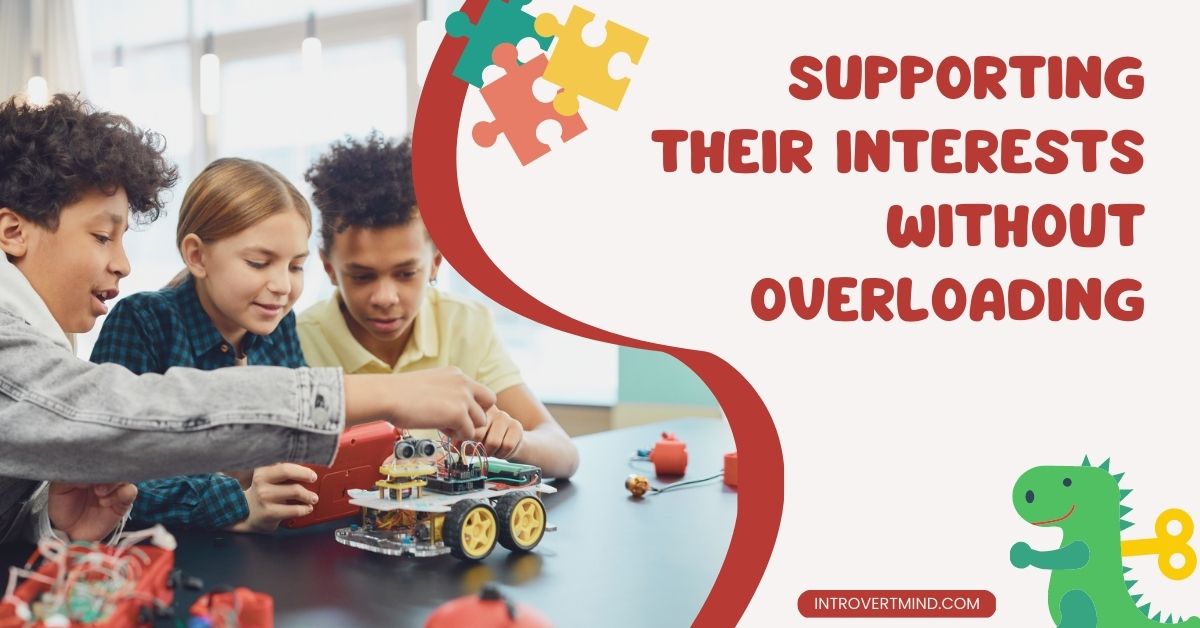As a parent, you always want the best for your child. But when it comes to introverted children, it’s important to recognize their unique needs and avoid overscheduling their days with too many activities. By being mindful of their limits, you can help them flourish and grow without overwhelming them.
Introverted children may need more downtime than their extroverted counterparts. They recharge their energy through periods of solitude and introspection. By understanding this, you can create a healthy balance between commitments and quiet time, ensuring your child’s well-being and happiness.
Remember, it’s not about limiting your child’s opportunities or experiences, but rather, tuning into their needs and preferences to ensure a harmonious family life. You can strike a delicate balance that allows your introverted child to thrive, grow, and most importantly, be themselves.
Signs Of Overscheduling

As a parent, it’s crucial to be aware of the signs that your introverted child may be overscheduled. Recognizing these indicators can help you make adjustments in their routine, ensuring they have the time and space they need to recharge.
Some common signs of overscheduling include:
- Increased irritability: If your child seems easily frustrated or has frequent meltdowns, it could be a sign that they are feeling overwhelmed by their commitments.
- Difficulty concentrating: An overscheduled child may struggle to focus on tasks, which can affect their academic performance and overall well-being.
- Physical symptoms: Stress from too many activities can manifest in headaches, stomach aches, or even sleep disturbances.
- Declining interest in activities: When a child loses enthusiasm for their hobbies, it might be time to reevaluate their schedule.
- Lack of alone time: Introverted children need time to recharge after social interactions. If your child is always on the go, they may not have ample time for self-reflection and relaxation.
It’s important for you, as a parent, to watch for these warning signs and have open conversations with your child about how they are feeling. By doing so, you can create a more balanced schedule that caters to their introverted nature, while still allowing them to participate in meaningful activities.
5 Tips For Creating A Balanced Schedule

Creating a balanced schedule for your introverted child is essential in supporting their growth and development. In this section, we will discuss a few key strategies that can help you effectively manage their activities and routine.
1. Prioritize Activities
Not all activities are equally important for your child’s development. To avoid overscheduling, prioritize activities that align with their interests and goals. You can create a list and then rank them based on importance and enjoyment for your child. This can help you allocate time for activities that truly matter.
2. Include Downtime
Introverted children need downtime to recharge and process their experiences. Ensure you build in breaks between activities and set aside quiet time for relaxation and reflection. This will help them feel more comfortable and less overwhelmed with their schedule.
3. Respect Their Preferences
It’s important to respect your child’s preferences on social interactions and group activities. Encourage them to participate, but also be mindful of their limits. Pay attention to their body language and verbal cues, and never force them into situations where they feel uncomfortable.
4. Limit Screen Time
While technology is a valuable tool in our daily lives, excessive screen time can negatively impact your child’s emotional and cognitive development. Establish a routine that sets healthy boundaries on device usage, and encourage them to engage in other activities that promote creativity and social skills.
5. Communicating With Teachers: Collaborating For Your Child’s Well-being
Working closely with teachers can be invaluable in ensuring a balanced schedule for your introverted child. Share your child’s unique needs with their teachers and come up with strategies to provide an optimal learning environment. Regular communication and collaboration can contribute greatly to your child’s well-being and success both in and out of school.
Benefits Of A Balanced Schedule

As a parent, carefully crafting a balanced schedule for your introverted child can benefit them in various ways. First, a balanced routine can offer your child the necessary downtime they need to recharge their energy. Introverts tend to feel drained after prolonged social interactions, so it’s essential to provide them with the restorative alone time they crave.
Secondly, a balanced schedule allows your child to develop healthy social skills at their own pace. By incorporating both social activities and quiet periods, your child will learn to participate in social experiences without becoming overwhelmed. Instead of pushing them to engage in constant social events, provide opportunities for interactions that suit their temperament, such as small group activities and playdates with familiar peers.
Next, setting up a balanced routine can help your introverted child focus on developing their strengths and interests. Introverts are often deep thinkers and prefer activities that require concentration and creativity. By allotting time for solo hobbies, such as reading, art, or music, you’ll enable your child to foster their individual talents and boost their self-esteem.
- Downtime to recharge.
- Develop social skills at their own pace.
- Focus on personal strengths and interests.
Lastly, another crucial advantage of a balanced schedule is that it sets the stage for a healthy work-life balance in the future. Teaching your child the importance of balancing personal time and social commitments will impart valuable life skills that will help them navigate their adult lives effectively.
Communicating With Your Child

Effective communication with your introverted child is essential in making sure they don’t become overscheduled. By being attuned to their needs, you can help create a balanced schedule that respects their introverted nature. This section talks about two key components of effective communication: active listening and encouraging honest feedback.
Active Listening
Active listening is crucial when talking to your introverted child about their schedule. Give them your full attention and ensure that you understand their point of view. To practice active listening:
- Maintain eye contact and eliminate distractions.
- Be patient and wait for them to finish their thoughts.
- Ask open-ended questions to encourage further conversation.
- Summarize what they’ve said and ask for clarification if needed.
Encouraging Honest Feedback
Creating an open and honest environment will empower your child to express their feelings about their schedule. To encourage honest feedback:
- Reassure them that their feelings are valid and important.
- Acknowledge and validate their concerns.
- Provide opportunities for them to speak up about their preferences and well-being.
- Be supportive and understanding when they communicate their limits.
By employing active listening and encouraging honest feedback, you can ensure that your child feels heard and respected. This will help you create a balanced schedule that supports their introverted nature.
Wrapping Up

In summary, it’s important to respect your introverted child’s needs and not overschedule their time. By understanding their preferences and creating a balanced schedule, you can help your child thrive.
Always make sure to provide ample space and time for your child to recharge and engage in activities they genuinely enjoy. Encourage open communication to understand their interests more deeply and be attentive to their feelings about their schedule.
Finally, remember that a balanced schedule includes a mix of socialization, solo activities, and family time. By nurturing your child’s introverted nature and finding the right balance, you will ultimately support their well-being and growth.

